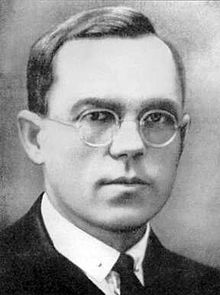AN ECONOMIC HERO
Born in 1892, Nikolai Dmitriyevich Kondratieff was one of post-revolutionary Russia’s most distinguished agricultural economists. Taught by some of the leading scholars of his time, particularly influential was Mikhail Ivanovich Tugan-Baranovsky, his tutor and a Ukrainian economist with whom he shared the view not only that capitalism would not collapse but also that it was capable of continuous development and that “crises” were its method of correcting problems.
In 1917, he served as deputy minister of food supplies in the short-lived Provisional Government of Alexander Kerensky. He was twenty five years old. In 1920, under Lenin’s rule, he established the Conjuncture Institute where he developed his long cycle theory describing the fifty to sixty year process of expansion, crisis and contraction characteristic of industrial-age capitalist economies.
“Crisis is a painful reaction against disproportion, opened in the system, of elements in (the) national and the world economy, (leading to the) formation of (a) new, mobile balance of these elements… (Such crises) were, they are and they will be. Dreams concerning construction of a crisis-less economy are no more than illusion, self-deception.”*
As an advocate of a market-led industrialization process for Russia’s reconstruction, Kondratieff was eventually marginalized by Stalin and then exiled to a monastery in Suzdal. On September 17, 1938, he was tried by the Military Collegium of the Supreme Court of the U.S.S.R. and executed on the same day. Two months later, Stalin’s Great Purge ended.
Sometimes called the depressionary or technological transition cycle, Kondratieff’s long cycle (also called the “long wave”) was recognized by Joseph Schumpeter as foundational to his concept of “creative destruction.”
Kondratieff’s long cycle also aptly describes the cycle whereby an Old Economy – characterised by the rusting out, wearing out and running out of capital goods, entrepreneurship and labour relations – is replaced by a New Economy built on transformational innovations and new, inexpensive energy sources.
************
*N. D. Kondratieff, The World Economy and Its Conjunctures During and After the War, V. Wolfson, trans., Yuri V. Yakovets and Natalia A. Makasheva, eds. (Moscow: International Kondratieff Foundation, 2004).

